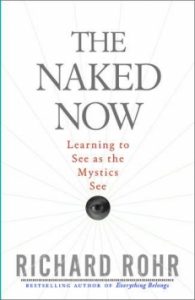 The Naked Now: Learning to See as the Mystics See by Richard Rohr (Crossroad Publishing Company, 2009)
The Naked Now: Learning to See as the Mystics See by Richard Rohr (Crossroad Publishing Company, 2009)
At the outset of life, God unites body and soul and sends us into the world. As a parting gift, the Creator presents us with an unassembled jigsaw puzzle representing the true and unique self God created us to be. Our mission is to search for and find all the scattered pieces, and assemble as much of the puzzle as we can. By the end of our lives, we hope to have discovered the greater picture of who we are in God’s sight.
Another way of saying this is that the primary goal of our lives is to discover our purpose for being and to shape our history accordingly. Most of us, I would guess, do not arrive at the hour of death completely assembled. It remains for God to “finish us” on the other side.
Catholics are fortunate to have the help of Franciscan Father Richard Rohr to guide us in the assembly our personal life puzzles. In The Naked Now, he unveils a vital piece that has been obscured for centuries and mostly unavailable to Roman Catholic Christians.
“True spirituality,” Rohr says, “is not a search for perfection or control or the door to the next world; it is a search for divine union now. The great discovery is always that what we are searching for has already been given! I did not find it; it found me. It is Jacob’s shout of Eureka! at the foot of his ladder to heaven in Genesis 28:16-17.”
At the heart of The Naked Now is a call for Christians to reject a narrow, dualistic (either/or) understanding of the mysteries of God and church in favor of a nondualistic (both/and) mindset that celebrates truth wherever it is found. Rohr quotes the wisdom of St. Bonaventure, who said, “God is the one whose center is everywhere and whose circumference is nowhere.”
Over the years of my life, only a small percentage of the books I have read fall into the category of “life changing.” Most are nonfiction. Some are fiction, with Victor Hugo’s Les Miserables at the apex of that list. The Naked Now has that same life-altering potential. Reader, beware.













Add comment